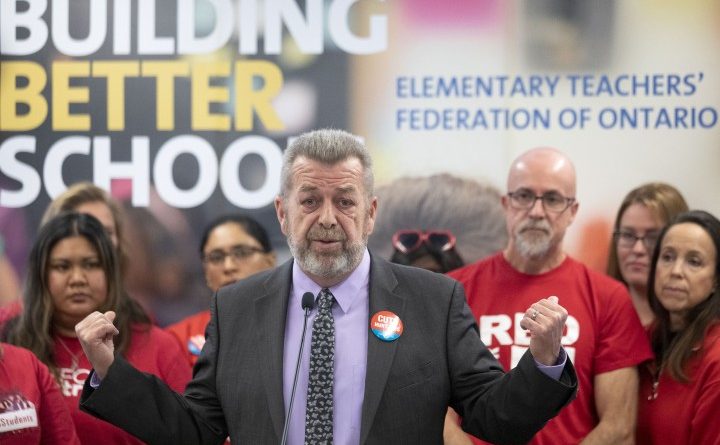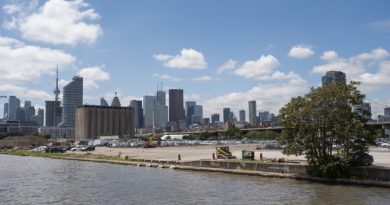Ontario public elementary teachers vote 98 per cent in favour of strike
TORONTO — Public elementary teachers and education workers in Ontario have voted 98 per cent in favour of a strike, with their union calling the result an overwhelming mandate for job action if they deem it necessary.
The Elementary Teachers’ Federation of Ontario say talks with the province at the central bargaining table have not progressed in any meaningful way. Union president Sam Hammond said Friday his members are concerned about class size, class structure, violence in classrooms, and the preservation of the current full-day kindergarten model.
Almost every issue has become a sticking point in the negotiations, he said.
“The results of those strike votes show that our members are overwhelmingly behind their central bargaining team and expect, absolutely expect, the government to get serious at the bargaining table,” Hammond said.
He would not lay out a timeline for a potential strike, but said the union would meet with a conciliator on Monday.
Premier Doug Ford, meanwhile, told the Toronto radio station NewsTalk1010 he was not surprised by the results of the vote but would not negotiate with the union in public.
“It sends a pretty clear message to the parents, and everyone in Ontario, they want to escalate this and we’re trying to turn down the heat,” he said.
Hammond wouldn’t talk about specific salary expectations, but government legislation that would limit wage increases for public sector workers looms over the negotiating table.
“Bill 124 is extremely problematic and I’ll say offensive,” Hammond said. “It is interfering, I would suggest to you, in that free and open bargaining process that we should be having at the table.”
The Progressive Conservative government introduced the bill just before the legislature broke for the summer — around when talks with the education unions were beginning. The Tories are now moving the legislation forward, potentially passing it as early as next week.
The bill would cap wage increases to an average of one per cent a year for three years for the broader public sector. That is the wage increase agreed to by the Canadian Union of Public Employees on behalf of its 55,000 education workers in a deal that narrowly averted a strike last month.
Hammond said the government has told ETFO it’s seeking $150 million in reductions to their collective agreement, something he said isn’t being asked of any other union.
“This government wants to save money, quite frankly, at the expense of our youngest children,” he said.
The union also remains worried about the future of full-day kindergarten, Hammond said. After the previous education minister, who was ultimately demoted, opened the door to changes to the program, the government later committed to “full-day learning” — phrasing that doesn’t ease the union’s fears.
Education Minister Stephen Lecce said Friday the government’s team remains committed to reaching a negotiated deal with the elementary teachers.
“While our government has been a reasonable and constructive force at the bargaining table … ETFO has taken another escalating step towards a strike which will disproportionately hurt our kids,” Lecce said in a statement.
High school teachers and teachers in the English Catholic system are also in the process of holding strike votes, with results expected in the next couple of weeks.
This round of bargaining has been tense, as it comes amid the government’s attempts to impose caps on wage increases and increase class sizes, which will mean thousands of fewer teachers in the system.
Major education unions have been critical of the government’s overall direction since taking power last year, including moves to increase high school class sizes from an average of 22 to 28, boost class sizes for Grades 4 to 8 from 23 students to 24, mandate e-learning courses and reduce per-student funding to boards.
Lecce has recently said he has offered in talks with the Ontario Secondary School Teachers’ Federation to scale back the increase in high school class sizes to 25.
NDP critic Marit Stiles said the current labour strife is due to Ford’s “deep cuts” to education.
This report by The Canadian Press was first published Nov. 1, 2019.
By: Allison Jones, The Canadian Press. News from © The Canadian Press, 20XX. All rights reserved. This material may not be published, broadcast, rewritten or redistributed.




